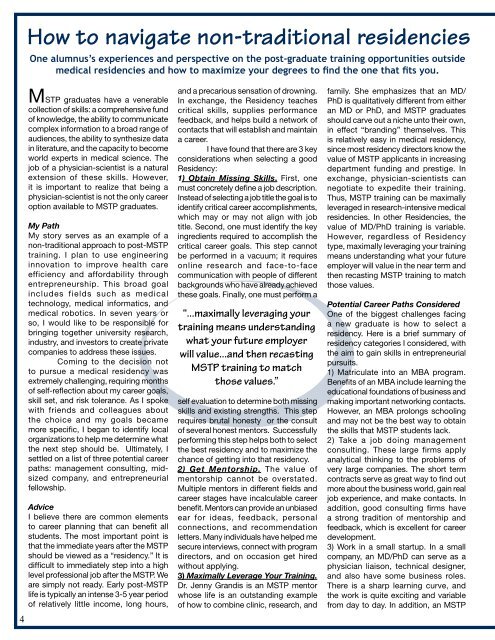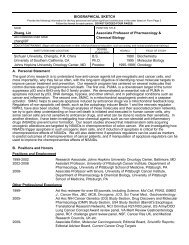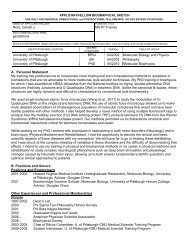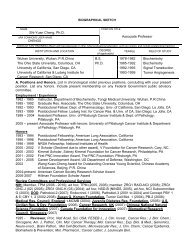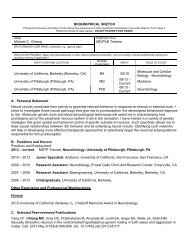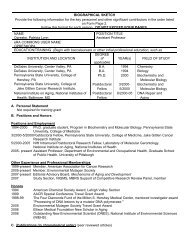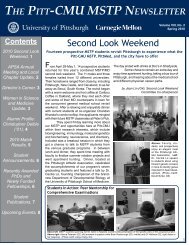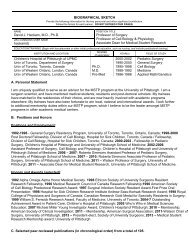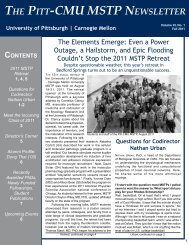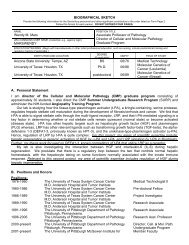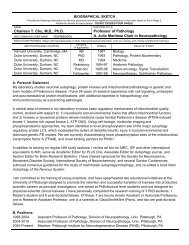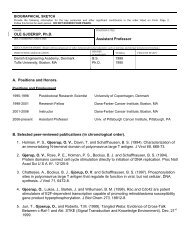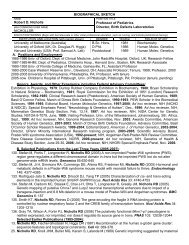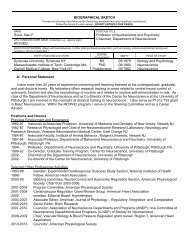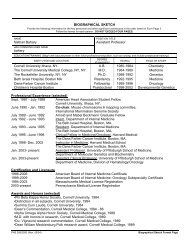Inside... - University of Pittsburgh :: MSTP
Inside... - University of Pittsburgh :: MSTP
Inside... - University of Pittsburgh :: MSTP
Create successful ePaper yourself
Turn your PDF publications into a flip-book with our unique Google optimized e-Paper software.
How to navigate non-traditional residencies<br />
One alumnus’s experiences and perspective on the post-graduate training opportunities outside<br />
medical residencies and how to maximize your degrees to find the one that fits you.<br />
4<br />
<strong>MSTP</strong> graduates have a venerable<br />
collection <strong>of</strong> skills: a comprehensive fund<br />
<strong>of</strong> knowledge, the ability to communicate<br />
complex information to a broad range <strong>of</strong><br />
audiences, the ability to synthesize data<br />
in literature, and the capacity to become<br />
world experts in medical science. The<br />
job <strong>of</strong> a physician-scientist is a natural<br />
extension <strong>of</strong> these skills. However,<br />
it is important to realize that being a<br />
physician-scientist is not the only career<br />
option available to <strong>MSTP</strong> graduates.<br />
My Path<br />
My story serves as an example <strong>of</strong> a<br />
non-traditional approach to post-<strong>MSTP</strong><br />
training. I plan to use engineering<br />
innovation to improve health care<br />
efficiency and affordability through<br />
entrepreneurship. This broad goal<br />
includes fields such as medical<br />
technology, medical informatics, and<br />
medical robotics. In seven years or<br />
so, I would like to be responsible for<br />
bringing together university research,<br />
industry, and investors to create private<br />
companies to address these issues.<br />
Coming to the decision not<br />
to pursue a medical residency was<br />
extremely challenging, requiring months<br />
<strong>of</strong> self-reflection about my career goals,<br />
skill set, and risk tolerance. As I spoke<br />
with friends and colleagues about<br />
the choice and my goals became<br />
more specific, I began to identify local<br />
organizations to help me determine what<br />
the next step should be. Ultimately, I<br />
settled on a list <strong>of</strong> three potential career<br />
paths: management consulting, midsized<br />
company, and entrepreneurial<br />
fellowship.<br />
Advice<br />
I believe there are common elements<br />
to career planning that can benefit all<br />
students. The most important point is<br />
that the immediate years after the <strong>MSTP</strong><br />
should be viewed as a “residency.” It is<br />
difficult to immediately step into a high<br />
level pr<strong>of</strong>essional job after the <strong>MSTP</strong>. We<br />
are simply not ready. Early post-<strong>MSTP</strong><br />
life is typically an intense 3-5 year period<br />
<strong>of</strong> relatively little income, long hours,<br />
and a precarious sensation <strong>of</strong> drowning.<br />
In exchange, the Residency teaches<br />
critical skills, supplies performance<br />
feedback, and helps build a network <strong>of</strong><br />
contacts that will establish and maintain<br />
a career.<br />
I have found that there are 3 key<br />
considerations when selecting a good<br />
Residency:<br />
1) Obtain Missing Skills. First, one<br />
must concretely define a job description.<br />
Instead <strong>of</strong> selecting a job title the goal is to<br />
identify critical career accomplishments,<br />
which may or may not align with job<br />
title. Second, one must identify the key<br />
ingredients required to accomplish the<br />
critical career goals. This step cannot<br />
be performed in a vacuum; it requires<br />
online research and face-to-face<br />
communication with people <strong>of</strong> different<br />
backgrounds who have already achieved<br />
these goals. Finally, one must perform a<br />
“...maximally leveraging your<br />
training means understanding<br />
what your future employer<br />
will value...and then recasting<br />
<strong>MSTP</strong> training to match<br />
those values.”<br />
self evaluation to determine both missing<br />
skills and existing strengths. This step<br />
requires brutal honesty or the consult<br />
<strong>of</strong> several honest mentors. Successfully<br />
performing this step helps both to select<br />
the best residency and to maximize the<br />
chance <strong>of</strong> getting into that residency.<br />
2) Get Mentorship. The value <strong>of</strong><br />
mentorship cannot be overstated.<br />
Multiple mentors in different fields and<br />
career stages have incalculable career<br />
benefit. Mentors can provide an unbiased<br />
ear for ideas, feedback, personal<br />
connections, and recommendation<br />
letters. Many individuals have helped me<br />
secure interviews, connect with program<br />
directors, and on occasion get hired<br />
without applying.<br />
3) Maximally Leverage Your Training.<br />
Dr. Jenny Grandis is an <strong>MSTP</strong> mentor<br />
whose life is an outstanding example<br />
<strong>of</strong> how to combine clinic, research, and<br />
family. She emphasizes that an MD/<br />
PhD is qualitatively different from either<br />
an MD or PhD, and <strong>MSTP</strong> graduates<br />
should carve out a niche unto their own,<br />
in effect “branding” themselves. This<br />
is relatively easy in medical residency,<br />
since most residency directors know the<br />
value <strong>of</strong> <strong>MSTP</strong> applicants in increasing<br />
department funding and prestige. In<br />
exchange, physician-scientists can<br />
negotiate to expedite their training.<br />
Thus, <strong>MSTP</strong> training can be maximally<br />
leveraged in research-intensive medical<br />
residencies. In other Residencies, the<br />
value <strong>of</strong> MD/PhD training is variable.<br />
However, regardless <strong>of</strong> Residency<br />
type, maximally leveraging your training<br />
means understanding what your future<br />
employer will value in the near term and<br />
then recasting <strong>MSTP</strong> training to match<br />
those values.<br />
Potential Career Paths Considered<br />
One <strong>of</strong> the biggest challenges facing<br />
a new graduate is how to select a<br />
residency. Here is a brief summary <strong>of</strong><br />
residency categories I considered, with<br />
the aim to gain skills in entrepreneurial<br />
pursuits.<br />
1) Matriculate into an MBA program.<br />
Benefits <strong>of</strong> an MBA include learning the<br />
educational foundations <strong>of</strong> business and<br />
making important networking contacts.<br />
However, an MBA prolongs schooling<br />
and may not be the best way to obtain<br />
the skills that <strong>MSTP</strong> students lack.<br />
2) Take a job doing management<br />
consulting. These large firms apply<br />
analytical thinking to the problems <strong>of</strong><br />
very large companies. The short term<br />
contracts serve as great way to find out<br />
more about the business world, gain real<br />
job experience, and make contacts. In<br />
addition, good consulting firms have<br />
a strong tradition <strong>of</strong> mentorship and<br />
feedback, which is excellent for career<br />
development.<br />
3) Work in a small startup. In a small<br />
company, an MD/PhD can serve as a<br />
physician liaison, technical designer,<br />
and also have some business roles.<br />
There is a sharp learning curve, and<br />
the work is quite exciting and variable<br />
from day to day. In addition, an <strong>MSTP</strong>


